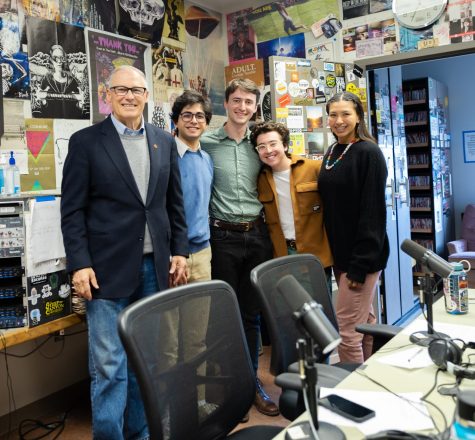Governor Inslee visits Walla Walla and unites community around climate action
April 6, 2023
Amid a statewide housing crisis and the impending threat of global climate collapse, Washington Governor Jay Inslee visited Walla Walla on Tuesday, March 14 to speak with the community and address issues of housing, education and environmental preservation.
Prior to his arrival on Whitman campus, the governor and his staff toured the new Evergreen Commons housing development constructed by the Walla Walla Housing Authority. According to Executive Director Renee Rooker, the governor’s visit was an exciting opportunity to showcase an effective model for rural affordable housing.
“We believe this opportunity will open doors for future funding to expand affordable housing in Walla Walla,” Rooker said.
As the morning at Evergreen Commons drew to a close, Inslee and his staff arrived on Whitman campus. They were greeted by President Sarah Bolton and a handful of students and staff before making their way to the KWCW radio studio. There senior Fraser Moore, senior Elio Van Gorden, first-year Lindsey Pasena-Littlesky and sophomore Parsa Keshavarzalamdari interviewed the governor on the air. They discussed topics ranging from Inslee’s plan to pour $4 billion into regional affordable housing to the internal battle against climate despair amongst the current generation of college students.

Keshavarzalamdari, who also serves as KWCW’s executive director, was instrumental in organizing the interview, with significant help from Director of the Career and Community Engagement Center Noah Leavitt. They were in touch with the governor’s staffers long before knowledge of Inslee’s visit was made public.
In addition to serving as president of Whitman’s Indigenous Peoples’ Education and Culture Club and straddling careers on both the soccer and lacrosse teams, Pasena-Littlesky has been fighting for Indigenous-centered land justice since long before her time as a member of the Whitman community. For her, a voice on the student interview panel meant an opportunity to push for further Indigenous involvement in the state’s climate plan.
“I truly believe that Indigenous communities have the key to a non-carbon economy,” Pasena-Littlesky said. “If [Inslee] does include the voice of Indigenous leaders, it could create this mutual relationship between land and all races, all genders [and] all classes to come together to focus on climate restoration.”
For Moore and Van Gorden, who have spent the past four years tirelessly organizing climate action and sustainability groups on campus, having their work endorsed by a government official was a massive step in the right direction.
As the interview drew to a close, Governor Inslee and his staff relocated to the Walla Walla Center for Children and Families, Walla Walla’s holistic pre-kindergarten early learning center. They engaged in a guided tour of the facility that included an extensive hands-on demonstration of how the Center has allocated their state funding.
“The idea of what we’re doing here in Walla Walla is unique; [we are] bringing in state programming, federal programming and local programming to provide kind of a wall-to-wall early learning experience for our littlest learners,” said Dr. Wade Smith, superintendent of Walla Walla Public Schools. “Every dollar we spend making sure our kids are ready for kindergarten pays off sevenfold down the road, so it’s important for the governor to see that this is what right looks like.”
A handful of local parents were invited to participate in the tour and share how the CCF had created opportunities for their children. For Ignacio Colín and Cory Spencer, each of whom have children who attend the Center, increased state funding means the ability to work full time without sacrificing quality child care.
“If it wasn’t for this program, my five-year-old wouldn’t be going to school right now,” Colín said.
By the end of the tour, Governor Inslee seemed to be thoroughly impressed, hailing Walla Walla as a leader in the fight for affordable housing and education across the state.
“You look at the integration of early childhood education, ECAP, headstart and transitional kindergarten in one building … Those things are really visionary.” Inslee told The Wire. “I’m hopeful that the rest of the state can join Walla Walla now to do that, and that’s why I’m very committed to freeing up $4 billion by issuing bonds to help other communities end homelessness. That’s important for education — it’s hard to do homework when you don’t have a home.”
The last stop on Governor Inslee’s itinerary was a presentation by representatives from the Tri-State Steelheaders, a community nonprofit dedicated to preserving salmon and steelhead habitats. A large crowd of Walla Walla residents, joined by enthusiastic Whitman students and faculty, gathered on the banks of Mill Creek behind Trinity Lutheran Church to hear executive director John Foltz, Michael Lambert, Corrine Sams and Bryan Burns speak on plans for completion of the Mill Creek Fish Passage.
Keshavarzalamdari sees opportunities like this, and student radio more broadly, as a great way to engage students in pushing for that accountability, both on and off campus.
“I think it is really important to empower students early on when they’re in college to be curious, ask questions and to involve them with policy making and activism, so when they go later on into their careers, they are even more confident activists and politicians,” Keshavarzalamdari said.
At the end of the day, all we have is each other, stressed Van Gorden — a sentiment that echoed through the valley as a community of passionate activists and leaders converged around the rare opportunity to converse with a key player in enacting the change they have spent their lives fighting for. What united them was rooted in community, love and a newly rejuvenated sense of urgency — a reminder that we cannot afford to be reckless.
The full Q&A with Moore and Van Gorden was published alongside this article. An edited recording of Inslee’s KWCW interview is available here.




